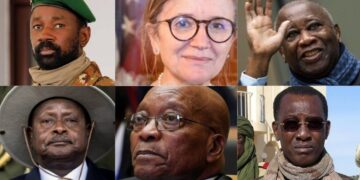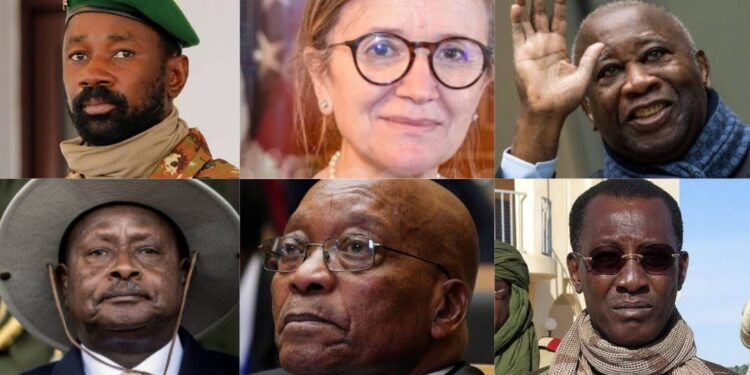By John Ikani
2021 was a year of highs and lows for the second-largest continent in the world.
Faced with the popular Coronavirus pandemic, dwindling economies, insecurity and political instability, Africa still managed to pull through. Here are 21 high points of the year 2021 in Africa.
January
1. Uganda’s Museveni wins election amid allegations of fraud
Uganda’s longtime leader Yoweri Museveni was re-elected in January for a sixth term in a vote his rival Bobi Wine rejected as rigged, calling on the country to dismiss the results. Mr Museveni won almost 59% of the vote, with Bobi Wine trailing with about 35%, the Electoral Commission said.
The 76-year-old has been in power for more than three decades. He was initially hailed as a modern leader following the brutal de facto dictatorships of Idi Amin Dada and Milton Obote.
But he has managed to maintain his grip on power through a mixture of encouraging a personality cult, employing patronage, compromising independent institutions and sidelining opponents, says the BBC’s Patience Atuhaire.
April
2. Chad’s President Idriss Déby dies after clashes with rebels
Chad’s President Idriss Déby died of his injuries in April following clashes with rebels in the north of the country. The announcement of Déby’s death came a day after provisional election results projected he would win a sixth term in office.
Déby, 68, spent more than three decades in power and was one of Africa’s longest-serving leaders. An army officer by training, he came to power in 1990 through an armed uprising. He was a long-time ally of France and other Western powers in the battle against jihadist groups in the Sahel region of Africa.
Following Déby’s death, it was announced that a military council led by his son, a 37-year-old four-star general, Mahamat Idriss Déby Itno will govern for the next 18 months.
June
3. Ivory Coast’s ex-President Laurent Gbagbo returns 10 years after arrest
Former Ivory Coast President Laurent Gbagbo returned home in June, 10 years after he was taken to the International Criminal Court (ICC) on charges of crimes against humanity. The 76-year-old was charged after his refusal to accept defeat in a 2010 election triggered a civil war that left 3,000 people dead. He always denied all the allegations.
Mr Gbagbo has been living in the Belgian capital Brussels since his release from detention three years ago. His successor and rival President Alassane Ouattara invited him back. Gbagbo’s return is seen as a test for the country and a population that still has the bloody conflict fresh in memory, with some analysts saying there are concerns that it could again destabilise the world’s largest cocoa producer.
Supporters say his return is necessary to reignite a reconciliation process that never got off the ground after the 2011 violence. Ouattara’s government has also said it welcomed his return to help reconciliation. In October, Gbagbo launched a new political party and has yet to rule out running for the next presidential election in 2025.
July
4. Ethiopian Forces Retreat in Tigray As Rebels Take Backe Mekele
Rebel fighters entered Mekele, the capital of Ethiopia’s Tigray region on June 29, prompting Ethiopia’s government to call a ceasefire after almost eight months of fighting. It marked a major turning point in the conflict. Mekele had been under the control of federal troops since November 28. The arrival of rebel fighters in the town sparked celebrations, with residents coming out and dancing in the streets.
The war has caused thousands of deaths, displaced more than two million people and plunged hundreds of thousands of Ethiopians into famine. On December 20, Tigrayan fighters announced that they would withdraw from regions outside of Tigray in order to allow humanitarian aid to arrive.
5. Former South African President Jacob Zuma sent to prison
South Africa’s untouchable former President, Jacob Zuma, was finally sentenced Tuesday to 15 months in prison for contempt of court, after multiple attempts and schemes to avoid testifying in state corruption investigations.
It was late on July 7, shortly before a midnight deadline, that former South African President Jacob Zuma left his homestead in Nkandla in a convoy of vehicles to turn himself over to police, a development which sparked days of rioting and looting by his supporters, leaving over 300 people dead. Zuma was released on medical parole in September but the country’s High Court ordered him to go back to prison in December.
September
6. Najla Bouden Romdhan becomes first female Prime Minister in Tunisia
Tunisian President, Kais Saied in September announced Najla Bouden Romdhane, a little-known University Engineer who worked with the World Bank, as Prime Minister on Wednesday, nearly two months after he came into power.
Originally from Kairouan, Najla is a French-educated geologist with a doctorate in geological engineering. She was also a lecturer at Tunisia’s national engineering school. In a speech given when she took up her post, Bouden said that “the fight against corruption will be the most important goal” of her government.
November
7. France Returns 26 Looted Artifacts And Artworks To Benin Republic
Twenty-six works of art seized by French colonial soldiers in 1892 were returned to Benin in November, a development that was a milestone in the long fight by African countries to recover looted artifacts.
The treasures were stolen from the kingdom of Dahomey in the south of present-day Benin and include the throne of Dahomey’s last king, Behanzin, as well as three totemic statues, four palace doors, several portable altars and three warrior dance staffs.
8. Swahili language gets special UN World Day
The United Nations in November declared July 7 each year as the world’s official day to celebrate the Swahili language. The announcement was made at the United Nations Educational, Scientific and Cultural Organisation (UNESCO) headquarters in France.
It is the first African language to be recognised by the UN and have its own day of celebration, according to UNESCO. Swahili is also the only African language to have been officially recognised by the African Union. Swahili, is widely spoken across East Africa, and in parts of Central and Southern African countries.
December
9. French troops leave Mali’s Timbuktu after eight years
French troops left Timbuktu on the 14th of December in what is seen as a major drawdown of nine years of deployment in the Sahelian nation.
It was in the northern Malian city that then French President Francois Hollande formally declared the start of France’s military intervention, in February 2013, designed to root out jihadist insurgents.
The departure of the French troops raised questions about the future of jihadist activity as militants put down roots in the countryside.
Malian officials, meanwhile, have accused France of abandoning their country with its “unilateral” decision to withdraw troops.
France has said that Malian forces are ready to take over in fighting the insurgency in northern Mali. Macron promised African leaders in a meeting in July that France will continue to help fight groups linked to al-Qaida and the Islamic State.
Jihadist attacks have grown more frequent in Mali since 2013, and the conflict has spilled over into neighbouring Burkina Faso and Niger.
10. UNESCO Recognise Congolese music and Senegalese national dish
On December 14, Congolese rumba was added to UNESCO’s intangible cultural heritage list, joining the Central African Republic’s polyphonic pygmy music (added in 2003) and the drums of Burundi (added in 2014). In Kinshasa and Brazzaville, rumba specialists trace the music’s origins back to the Kongo kingdom, where a dance called Nkumba originated. Rumba in its current, modern form dates back hundreds of years. It has been made famous by musicians like Papa Wemba, Grand Kallé, Wendo, Tabu Ley Rochereau, Franklin Boukaka and Pamelo Mounka.
UNESCO also added thiebou dieune, Senegal’s national fish dish, to its intangible heritage list in December. The dish, made with rice, fish and different vegetables, served with or without tomato, is often eaten as a lunchtime dish in families and restaurants across the country.



































